Text
Today the Church honors St. James the Persian (the Sawn-Asunder), martyr.
Ora pro nobis.
St. James was born in the fourth century AD in ancient Persia into a pious Christian family, both wealthy and illustrious. His wife was also a Christian, and the couple raised their children in piety, inspiring in them a love for prayer and the Holy Scriptures. James occupied a high position at the court of the Persian emperor Izdegerd (AD 399-420) and his successor Barakhranes (AD 420-438). But on one of the military campaigns James, seduced by the emperor’s beneficence, was afraid to acknowledge himself a Christian, and so he offered sacrifice to idols with the emperor.
Learning of this, James’ mother and wife wrote him a letter, in which they rebuked him and urged him to repent. Receiving the letter, James realized the gravity of his sin. Faced with the horror of being cut off not only from his family, but also from God Himself, he began to weep loudly, imploring the Lord for forgiveness.
His fellow-soldiers, hearing him pray to the Lord Jesus Christ, reported this to the emperor. Under interrogation, Saint James bravely confessed his faith in the one True God. No amount of urging by the emperor could make him renounce Christ. The emperor then ordered the saint to be put to death.
They began to cut off his fingers and his toes one by one, then his hands and his feet, and then his arms and legs. During the prolonged torture Saint James offered prayers of thanksgiving to the Lord, Who had granted him the possibility of redemption from his sins by enduring these terrible torments. Finally, the martyr was beheaded. Christians gathered up the pieces of his body and buried them with great reverence. He was killed in Beth Lapat (Gundishapur).
His death, along with the persecution of other Christians in the Sasanid Empire, started the Roman-Sassanid War (AD 421-422).
Almighty God, by whose grace and power your holy martyr James triumphed over suffering and was faithful even to death: Grant us, who now remember him in thanksgiving, to be so faithful in our witness to you in this world, that we may receive with him the crown of life; through Jesus Christ our Lord, who lives and reigns with you and the Holy Spirit, one God, forever and ever.
Amen.
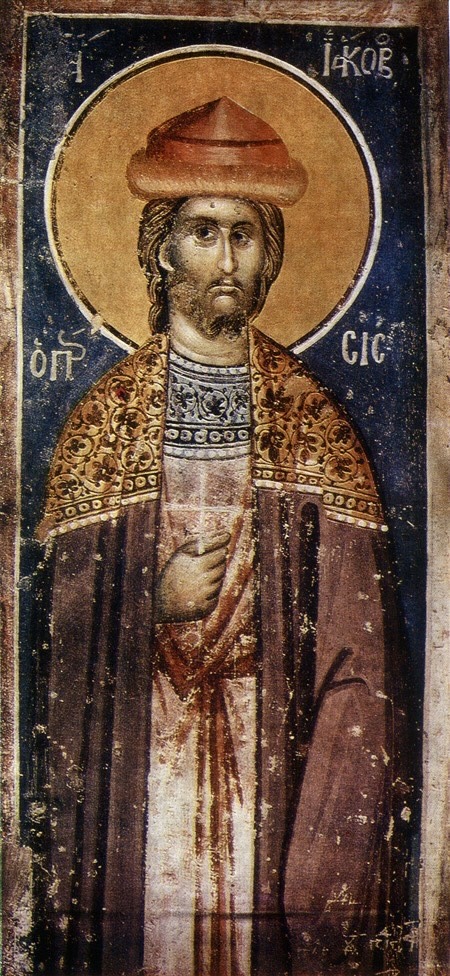
#father troy beecham#christianity#jesus#god#saints#salvation#peace#faith#martyrs#early church#persia#christian persecution
1 note
·
View note
Text
Fr. Troy Beecham
Sermon, Proper 29 A, 2023
The Last Sunday after Pentecost, often called the Feast of Christ the King
Matthew 25:31-46
“Jesus said, “When the Son of Man comes in his glory, and all the angels with him, then he will sit on the throne of his glory. All the nations will be gathered before him, and he will separate people one from another as a shepherd separates the sheep from the goats, and he will put the sheep at his right hand and the goats at the left. Then the king will say to those at his right hand, ‘Come, you that are blessed by my Father, inherit the kingdom prepared for you from the foundation of the world; for I was hungry and you gave me food, I was thirsty and you gave me something to drink, I was a stranger and you welcomed me, I was naked and you gave me clothing, I was sick and you took care of me, I was in prison and you visited me.’ Then the righteous will answer him, ‘Lord, when was it that we saw you hungry and gave you food, or thirsty and gave you something to drink? And when was it that we saw you a stranger and welcomed you, or naked and gave you clothing? And when was it that we saw you sick or in prison and visited you?’ And the king will answer them, ‘Truly I tell you, just as you did it to one of the least of these who are members of my brothers, you did it to me.’ Then he will say to those at his left hand, ‘You that are accursed, depart from me into the eternal fire prepared for the devil and his angels; for I was hungry and you gave me no food, I was thirsty and you gave me nothing to drink, I was a stranger and you did not welcome me, naked and you did not give me clothing, sick and in prison and you did not visit me.’ Then they also will answer, ‘Lord, when was it that we saw you hungry or thirsty or a stranger or naked or sick or in prison, and did not take care of you?’ Then he will answer them, ‘Truly I tell you, just as you did not do it to one of the least of these my brothers, you did not do it to me.’ And these will go away into everlasting punishment, but the righteous into everlasting life.”
The Gospel reading for this last Sunday after Pentecost, also known as the Feast of Christ the King, is often called the ‘parable of the sheep and the goats’. But there’s a problem with calling it that because it isn’t actually a parable. Jesus always introduces His parables by saying something like ‘the kingdom of heaven is like this’, which this Gospel reading does not have. Moreover, this Gospel reading is not even primarily about the sheep and goats. It is primarily about Jesus declaring His authority as the Judge of all peoples at the end of the ages. I have heard sermon after sermon focusing on the sheep and goats, which almost always end up saying that salvation, being a sheep, is to be had by being occasionally nice to strangers. Put another way, how can we feel good about ourselves by doing sporadic good works. In do so, what we are really doing is trying to figure out how to get away from the wonderful, yet awful, majesty of the One who will be our Judge because we feel unclear whether or not we are a sheep or a goat. By focusing on the sheep and goats, on ourselves, we are entirely missing the point of what Jesus is saying. So, if it is not any of these things, what is Jesus saying to us in this narrative?
To begin with, we must look at the larger context of the readings from the Gospel according to St. Matthew that we have been reading for the last several weeks. Beginning in chapter 24, we find Jesus and his disciples at the Temple in Jerusalem, just days from His arrest, trial, crucifixion, and resurrection. Jesus tells his disciples to look at the splendor of the Temple, and it was splendorous…one of the ancient 7 wonders of the world. He shocks them when He tells them that the Temple will soon be destroyed (which it was, in AD 70, when the Roman empire destroyed Jerusalem, killing an estimated one million Jews, and sold many tens of thousands into slavery, and renaming the region Syria Palaestina to try and erase Israel and the Jews from history, something we are still dealing with today), and after that, at a time that only the Father knows, the end of time and the dawning of the Kingdom of God will come. The disciples are astonished, dumbfounded, and ask Jesus what will the coming of the Kingdom of God look like, and what will be the signs of it nearing. As you will recall, for the last several weeks Jesus has been teaching us that very thing. He has told us that the coming of that great day will be sudden and unexpected, and so we must remain vigilant and faithful. He has given us the parables about the faithful and wicked servants, the wise and foolish virgins, and the bags of gold to illustrate the urgency of remaining awake and vigilant. And it is urgent because there will be a Day of Judgment, and all the peoples of the earth will be judged. In the face of the coming of that day, how will He judge the world?
Here we see Jesus as King, judging the peoples of the world. We read of sheep and goats, people being divided to the left and right, some going to everlasting life and others to everlasting punishment. We are unused to such stark words from Jesus, at least in the last century or so here in the West. Earlier generations were habituated to the concept of judgment, reward, and damnation, but we have largely moved away from such ideas in Western religious culture. Over the last few decades, we have become more habituated to the gentle shepherd Jesus, buddy Jesus, anti-capitalist Jesus, socialist Jesus…all kinds of new ways of thinking about Jesus, all of them very human, and none of them recognizing him as the incarnate Son of God to whom the Father has given all authority and judgment, and who will one day judge all the peoples of the world. This Sunday is a sobering reminder that Jesus is the Son of God, the King of kings and the Lord of lords, and He will Judge of all humankind, some going to everlasting life and others to everlasting punishment.
So, we have to look at this narrative with fresh eyes. We have become used to hearing the focus being on the sheep and the goats, on us, and how our behavior determines which of the two we will be when we stand before the Lord, hearing sermons say something like this: the ‘least of these’ are the poor, the rejected, the persecuted, in sick, and the prisoners of the world, and the sheep are those who care for the them. Salvation is understood in this way as being someone who does a bit of good works for the suffering people of the world. There is no need here of being baptized, of partaking of His Body and Blood, of obeying the commands of Jesus, of loving each other as He loves us, of taking up our cross to follow Him, of worshipping God with all that we are, and of living under the righteous rule of our king, Jesus. The goats, then, are those who neglect caring for the suffering people of the world, rather than those who reject the call of Jesus to become His disciples, forsaking all, taking up their cross and following him. Do not misunderstand me; caring for the suffering people of the world is theologically important and entirely commendable, but this Gospel narrative is not about that. There is an important phrase that often gets either left out or is misunderstood in this reading that is central to understanding what Jesus us saying, and that phrase is “the least of these my brothers”.
Jesus will one day invite those on his right to ‘Come, you who are blessed by my Father; take your inheritance, the kingdom prepared for you since the creation of the world…’. This judgment will come as a complete surprise to those standing before Him, and He has to explain that ‘Whenever you did this for the least of my brothers…you did it for me’. In the same way, those on his left are also surprised that they have encountered the Jesus in His moment of need and are horrified at being judged to suffer everlasting punishment. If this narrative was Jesus’ way of teaching us about helping the suffering people of the world as the way to gain a favorable judgment, then those who helped or failed to help the suffering, especially we who have been doing it for two millennia, would hardly be surprised to find that they had been doing as the king asked.
But there is nothing in the narrative itself that speaks about entrance into the kingdom of God as a reward based on a life of good works. This is difficult for us to hear. Western Christianity has largely wandered back to the ancient error of thinking that salvation can be earned by anything that we can do or that we fail to do. Salvation is the free gift of God, something that God gives to his children. Rather than proposing a system by which we can merit eternal paradise and escape eternal punishment, this narrative uses the language of family, of inheritance. Language about inheritance echoes God’s promise to the Jewish, to whom God has given the land of Israel as an ‘inheritance’, but not because of they were particularly good or faithful; quite the contrary. They were made inheritors of the promise because God chose them as His people, and they inherit as a son inherits from a father in the ancient world. You don’t need to be ‘good’, you need to be a child of God, chosen by God and adopted by God. The New Testament is replete with this language of adoption by God, and of receiving the inheritance because of God’s gracious generosity now made possible to all peoples through his Son, Jesus, the Son of Man, the Resurrected Savior.
How, then, may we be adopted, how do we become children of God in Jesus? We have culturally fallen prey to the common misunderstanding that we are all brothers and sisters. In His Great Commission to His disciples, Jesus said that all must be baptized to become His disciples. He also said that any who be His disciples must partake of his Body and Blood. Here we find His two Sacraments by which we become one with Him. Many found this teaching too difficult to accept and departed from Him. In the Gospel according to St. Matthew, Jesus also only ever refers to his brothers or sisters as those who do the will of God by becoming his followers, those who will take up the cross and follow him. This is particularly clear in Matthew 12:49, when Jesus astonishes everyone by saying that His family are those disciples who obey his commands and who take up their cross and follow Him, and not simply those related by blood or human community, or even call Him “Lord”. Many had trouble with this and left Jesus, because Jesus is clear that to follow him often means to be rejected by family and society, to become homeless, to experience persecution, and even death. We in the West have come far from having to experience these things as disciples of Jesus, but our Christian sisters and brothers around the world face this on a daily basis. Christians are the single most persecuted religious group in the world. In the last decade Christianity has nearly been eradicated in the lands of its birth in the Middle East and North Africa by Muslim violence. On average so far this year, 15 Christians are martyred for the Faith every day according to credible estimates by international observers.
In very real terms for many, to follow Jesus means they will be like Him, becoming a refugee, expelled from family, jailed, reliant on the charity and provision of others, and face death. With this in mind, the narrative then identifies the ‘least of these’ as not being the poor of the world in general, but is rather a direct reference to being a disciple of Jesus and the consequences of that choice in a world hostile to His Gospel. When read like this, those on the king’s right are people who have aided His persecuted disciples, and in doing so have welcomed Jesus Himself because His disciples have become one body with Him through Holy Baptism, in partaking in His body and blood in the Holy Eucharist, and through faithfulness to His commands. This echoes what St. Paul comes to understand when he hears Jesus say to him as he is on his way to persecute the disciples of Jesus in Damascus: ‘Why do you persecute me?’ To persecute the disciples of Jesus because they are his disciples is to persecute him, and to persecute him is to persecute the one who will sit on the Throne of Judgment at the last day.
The division of the people of the world, then, is not between those who do or do not care for the suffering of the world, but between those who care for the suffering followers of Jesus or don’t, and in so doing show their attitude to the king himself. There is no doubt that this reading of this narrative is challenging, but it does have the virtue of being faithful to the words of Jesus. It may seem odd that those who are already part of His body are not part of this judgment, but this is because their judgment has already been given by their participation in the life, death, and resurrection of Jesus through their Holy Baptism, in partaking of His most Holy Body and Blood in the Holy Eucharist, and their faithful submission to Jesus as their King, obeying His commands.
In the end, this narrative is entirely about Jesus, who He is and who He will be: He is the exalted Son of Man, who brings the needs of people of God into the presence of the Father; He is the exalted king who even now sits on the right hand of the throne of God as rightful king; and He is the true Shepherd, through whom the Father exercises His reign and his entrusts His final, just judgement. It is also about who He is in his disciples.
For many of us, to be united with Jesus in the Sacraments and through faithfulness to his commands carries little risk; but for many hundreds of millions of his disciples around the world it entails truly risking being hungry, thirsty, naked, a stranger, sick, in prison, or murdered. This has been true for Christians in many parts of the world in many ears in history. It is perhaps only we who have been free from persecution who have drifted away from understanding Jesus’ intent in this narrative.
We must be careful here to not make the misguided step of setting up our own seats of judgment about who we think will be rewarded or punished. We are not judges! We cannot possibly know who will be judged as blessed or as condemned. We do not know the secrets of people’s hearts, nor do we know all the deeds of a person, and so we judge no one, not even ourselves. Instead, we trust in Jesus, the Son of God who took on our humanity, who suffered at our hands, accepted being an outcast, and was cruelly murdered by us, the very ones He came to save. We trust in Jesus, who destroyed death by accepting his own death, and rose triumphant from the grave. We trust in Jesus because He will judge us all in love. We trust Him because His own prayer is that all people may become one in Him, and therefore become one with the Father just as He and the Father are one. And in that trust, sisters and brothers, we who are His body through Holy Baptism and in partaking in His most holy Body and Blood, His Church, must faithfully engage the world as His disciples, proclaiming the good news of salvation both with the testimony of our lives and with the words of our mouths, making disciples of all peoples, baptizing them in the name of the Father, the Son, and the Holy Spirit, and teaching them to be faithful to all of His commandments. We must accept the risk, taking up the cross and following Him. We must not fail to offer the good news of His salvation to any person. And He will be with us, through persecution, suffering, and all manner of things, unto the end of the ages.
Almighty and everlasting God, whose will it is to restore all things in your well-beloved Son, the King of kings and Lord of lords: Mercifully grant that the peoples of the earth, divided and enslaved by sin, may be freed and brought together under His most gracious rule; who lives and reigns with you and the Holy Spirit, one God, now and forever.
Amen.

2 notes
·
View notes
Text
Today the Church honors Pope St. Peter I of Alexandria, Martyr.
Ora pro nobis.
St. Peter was born and raised at Alexandria. He was a highly educated man, and was eventually the head of the famed Catechetical School of Alexandria. In the year AD 300, he became the 17th Pope of the Alexandrian Church, succeeding his teacher and spiritual guide, the holy Pope Theonas.
Forced into exile from the city during the anti-Christian persecutions under the emperors Diocletian and Maximian, Saint Peter traveled through many lands, encouraging his flock by letter. St. Peter returned to his city, in order to guide the Alexandrian Church personally during this dangerous period. The saint secretly visited Christians locked up in prison, encouraging them to be steadfast in faith, assisting the widows and orphans, preaching the Word of God, constantly praying and officiating at the divine services. And the Lord kept him safe from the hands of the persecutors.
During this time of unrest, the heretic Arius, who denied the divinity of Jesus Christ, began to spread his false teaching. When Arius refused to be corrected and submit to the truth, Saint Peter anathematized the heretic and excommunicated him from the Church. Arius then sent two of Saint Peter’s priests to beg the saint to lift the excommunication from him, pretending that he had repented and given up his false teachings. This was not true, for Arius hoped to succeed Saint Peter as Archbishop of Alexandria. Saint Peter, under the guidance of the Holy Spirit, saw through the deceit of Arius, and so he instructed his flock not to believe Arius nor to accept him into communion.
Under the wise nurturing of Saint Peter the Church of Alexandria strengthened and grew in spite of the persecutions. But finally, on orders from the emperor Maximian (AD 305-311), the saint was arrested and sentenced to death. A multitude of people gathered at the entrance of the prison, expressing their outrage. Wanting to avoid bloodshed and a riot by the people, the saint sent a message to the authorities, in which he suggested that they make an opening in the back wall of the prison, so that he might be taken away secretly to execution.
In the dark of the night Saint Peter went with the executioners, who took him beyond the city walls and beheaded him at the same spot where formerly Saint Mark had been executed. This took place in the year AD 311. In the morning, when people learned of the death of their beloved Pope, a crowd gathered at the place of execution. They took up the body and head of the martyr and went to the church, dressing him in his bishop’s vestments, and laid his body to rest.
Saint Peter, a great champion of Orthodoxy, is known also as a profound theologian. Passages from his book, “On the Divinity (of Jesus Christ)”, were consulted at the Councils of Ephesus (AD 431) and Chalcedon (AD 451). Of all his works, the most widely known and highly esteemed by the Church are his “Penitential Canons”.
Almighty God, by whose grace and power your holy martyr Peter triumphed over suffering and was faithful even to death: Grant us, who now remember him in thanksgiving, to be so faithful in our witness to you in this world, that we may receive with him the crown of life; and may your Church always have faithful and wise pastors to guide it in the true Faith; through Jesus Christ our Lord, who lives and reigns with you and the Holy Spirit, one God, forever and ever.
Amen.
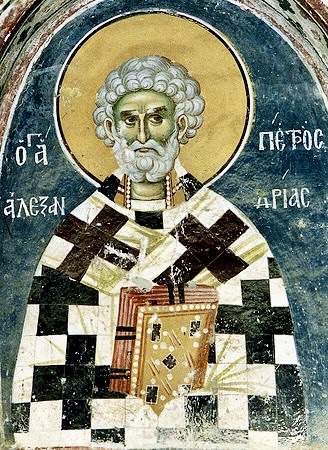
#father troy beecham#christianity#jesus#god#saints#salvation#peace#faith#martyrs#early church#eastern christianity#African Christianity#Coptic Orthodox Church
1 note
·
View note
Text
Today the Church honors Pope St. Clement I of Rome.
Ora pro nobis.
Pope Clement I, also known as Saint Clement of Rome, is counted as one of the Apostolic Fathers of the Church, along with St. Polycarp and St. Ignatius of Antioch. Few details are known with certainty about Clement's life.
Tradition says that when he was still a young man from a wealthy family, the news of Jesus and His teaching began to reach the capital, Rome. Clement left his home and estate and went to the lands where the Apostles were preaching. At Alexandria, Clement met the holy Apostle Barnabas, listening to his words with deep attention, and perceiving the power and truth of the Word of God. Seeking deeper knowledge, he traveled then to Israel, where he met and was baptized by the holy Apostle Peter and became his zealous disciple and constant companion, sharing his toil and sufferings with him.
Shortly before his own sufferings and death, Saint Peter consecrated Saint Clement as Bishop of Rome. After the death of the Apostle Peter, Saint Linus (AD 67-79) was the next Bishop of Rome, succeeded by Saint Anacletus/Cletus (AD 79-91), and then Saint Clement (AD 88-c. 99). Early church lists place him as the second or third bishop of Rome. The Roman Catholic Church lists him as the fourth pope. In one of his works, Jerome listed Clement as "the fourth bishop of Rome after Peter, if indeed the second was Linus and the third Anacletus, although most of the Latins think that Clement was second after the apostle." Clement is put after Linus and Cletus/Anacletus in the earliest (c. AD 180) account, that of St. Irenaeus, who is followed by St. Eusebius of Caesarea.
The Liber Pontificalis presents a list that makes Linus the second in the line of bishops of Rome, with Peter as first; but at the same time it states that Peter ordained two bishops, Linus and Anacletus, for the priestly service of the community, devoting himself instead to prayer and preaching, and that it was to Clement that he entrusted the Church as a whole, appointing him as his successor. Tertullian considered Clement to be the immediate successor of Peter. St. Eusebius, in his book Church History, mentions Clement as the third bishop of Rome and the "co-laborer" of Paul.
Clement’s inclusion in these lists has been very controversial among scholars. Many scholars point out that there were priest-bishops as early as the 1st century AD, but there is no evidence for a monarchical episcopacy in Rome or anywhere else, such as we have now, at such an early date. It is, however, probable that the Church at Rome had at first two apostolic successions, one Petrine and the other Pauline, but that they speedily merged into one; and this will account for the confusion in the lists of the first bishops of Rome. This has led to speculation that, given the overlapping dates of Linus, Anacletus, and Clement, perhaps St. Peter appointed Clement as overseer (bishop) of the Jewish Christians of Rome and St. Paul appointed Linus and then Anacletus as overseer of the Gentiles Christians of Rome.
The virtuous life, charitable works and prayerful activity of Saint Clement converted many to the Faith. He once baptized 424 people on the day of Pascha (Easter). Among the baptized were people of all social classes: slaves, officials, and even members of the imperial family.
Clement's only genuine extant writing is his letter to the church at Corinth (1 Clement) in response to a dispute in which certain presbyters of the Corinthian church had been deposed. He asserted the authority of the presbyters as rulers of the church on the ground that the Apostles had appointed such. His letter, which is one of the oldest extant Christian documents outside the New Testament, was read in church, along with other epistles, some of which later became part of the Christian canon. These works were the first to affirm the apostolic authority of the clergy. A second epistle, 2 Clement, was attributed to Clement, although recent scholarship suggests it to be a homily by another author. In the legendary Clementine Literature, Clement is the intermediary through whom the apostles teach the church.
According to tradition, Clement was banished and imprisoned under the Emperor Trajan and was set to work in a stone quarry. Finding on his arrival that the prisoners were suffering from lack of water, he knelt down in prayer. Looking up, he saw a lamb on a hill, went to where the lamb had stood and struck the ground with his pickaxe, releasing a gushing stream of clear water. This miracle resulted in the conversion of large numbers of the local pagans and his fellow prisoners to Christianity. As punishment, Saint Clement was martyred by being tied to an anchor and thrown from a boat into the Black Sea.
Almighty God, you chose your servant Clement of Rome to recall the Church in Corinth to obedience and stability: Grant that your Church may be grounded and settled in your truth by the indwelling of the Holy Spirit; reveal to it what is not yet known; fill up what is lacking; confirm what has already been revealed; and keep it blameless in your service; through Jesus Christ our Lord, who lives and reigns with you and the Holy Spirit, one God, forever and ever.
Amen.
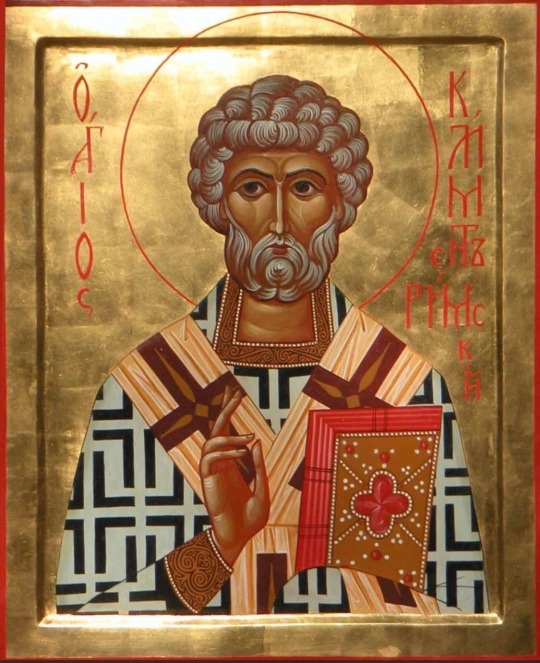
3 notes
·
View notes
Text
Today the Church honors Sts. Philemon, Apphia, and Archippus, Martyrs.
Orate pro nobis.
Philemon and his wife Apphia lived in the city of Colossae in Phrygia, Asia Minor. When St. Paul came to Colossae to preach the Gospel of Jesus, Philemon and Apphia became disciples of the Lord. After they were baptized by the holy Apostle Paul, they converted their house into a house of prayer, one of the first churches, where all those who believed in Christ gathered to learn the truths of the Faith, for prayer and to worship God, and to receive the Sacraments. They were noted for having devoted themselves to serving the sick and outcast.
Saint Philemon preached the Word of God throughout Phrygia. The holy Apostle Paul continued to be his guide, and addressed to him his Epistle filled with love, and in which he sends blessings “to Philemon our dearly beloved, and fellow laborer, and to our beloved Apphia, and to Archippus our fellow soldier, and to the church in thy house” (Phil 1:1-3).
Saint Onesimus, also mentioned in the Epistle, was Saint Philemon’s former slave, whom he freed after his conversion.
Saints Philemon and Apphia, and also Saint Archippus (who also lived at Colossae), were all martyred for the Faith during the persecution of Nero (AD 54-68), the same persecution during which Sts. Paul and Peter were martyred.
These are the details. During a pagan festival, an enraged crowd rushed into the Christian church in their home while the holy liturgy was being celebrated. All fled in terror, and only Saints Philemon, Apphia, and Archippus remained. They were seized by the mob and led them off to the city prefect. The crowd beat and stabbed Saint Archippus with knives, and he died on the way to the court. Saints Philemon and Apphia were stoned to death by order of the prefect in AD 68.
Almighty God, by whose grace and power your holy martyrs Philemon, Apphia, and Archippus triumphed over suffering and were faithful even to death: Grant us, who now remember them in thanksgiving, to be so faithful in our witness to you in this world, that we may receive with them the crown of life; through Jesus Christ our Lord, who lives and reigns with you and the Holy Spirit, one God, forever and ever.
Amen.
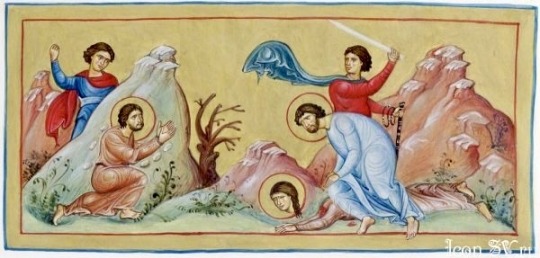
#father troy beecham#christianity#jesus#god#saints#salvation#peace#faith#martyrs#early church#new testament
1 note
·
View note
Text
Today the Church honors St. Dasius of Durostorum, Martyr.
Ora pro nobis.
Dasius is a Christian martyr of the early 4th century AD. He was a Roman soldier of Legio XI Claudiana at Durostorum on the Danube River (modern Silistra), Moesia Inferior. Dasius was the first of twelve martyrs executed at Durostorum during the fourth Diocletian edict of persecution of Christians in AD 304.
The inhabitants of Durostrum were preparing for the annual Saturnalia festival. In Roman mythology, Saturn was an agricultural deity who was said to have reigned over the world in a Golden Age, when humans enjoyed the spontaneous bounty of the earth without labour in a state of innocence. The revelries of Saturnalia were supposed to reflect the conditions of the lost mythical age.
The holiday was celebrated with a sacrifice at the Temple of Saturn and a public banquet, followed by private gift-giving, continual partying, and a carnival atmosphere that overturned Roman social norms: gambling was permitted, and masters provided table service for their slaves as it was seen as a time of liberty for both slaves and freedmen alike. To conclude the festival, sources of the third century AD and later, Saturn is recorded as receiving dead gladiators as offerings (munera) during or near the Saturnalia. These gladiatorial events, ten days in all throughout December, were presented mainly by the quaestors and sponsored with funds from the treasury of Saturn. The practice of gladiator munera was criticized by Christian apologists as a form of human sacrifice.
In this context, we have the story of Dasius. The choice of his compatriots fell upon Saint Dasius, since in the city there was not a more handsome youth. Learning of this, the saint said, "If I am fated to die, then it’s better to die for Christ as a Christian." He openly confessed his faith in Christ before his fellow citizens and refused to take part in the shameful ritual. He denounced the impiety and error of the idolaters, and in so doing converted many of them to Christ. Therefore, on the orders of the emperors Diocletian (AD 284-305) and Maximian (AD 305-311), he was beheaded after cruel tortures.
Almighty God, who gave to your servant Dasius boldness to confess the Name of our Savior Jesus Christ before the rulers of this world, and courage to die for this faith: Grant that we may always be ready to give a reason for the hope that is in us, and to suffer gladly for the sake of our Lord Jesus Christ; who lives and reigns with you and the Holy Spirit, one God, forever and ever.
Amen.

2 notes
·
View notes
Text
Today the Church honors St. Hypatius, Bishop and martyr.
Ora pro nobis.
We do not much information about his early life. We do know that he was bishop of the city of Gangra in Paphlagonia (Asia Minor). In the year AD 325, he participated in the First Ecumenical Council at Nicea, at which the heresy of Arius (the teaching that Jesus was a created being, not an eternal like the Father, and was therefore of similar being, “homoi”-similar, and “ousia”-being, rather than of the same being, “homo”-same, “ousia”- being) was anathematized. Nicene Orthodoxy chose the teaching of St. Athanasius that Jesus was “homoousia” with the Father and the Holy Spirit, which remains the Nicene orthodox teaching of the Church.
When Saint Hypatius was returning in AD 326 from Constantinople to Gangra, followers of the schismatics Novatus and Felicissimus, ardent supporters of Arius, fell upon him in a desolate place. The heretics ran him through with swords and spears, and threw him into a swamp. Like the Protomartyr Stephen, Saint Hypatius prayed for his murderers.
One of them, a woman, struck the saint on the head with a stone, killing him. The murderers hid his body in a cave, where a Christian who kept straw there found his body. Recognizing the bishop’s body, he hastened to the city to report this, and the inhabitants of Gangra piously buried their beloved archpastor.
After his death, the relics of Saint Hypatius were famous for numerous miracles, particularly for casting out demons and for healing the sick.
Almighty God, you gave to your servant Hypatius special gifts of grace to be a faithful bishop who holds to the unchanging True Faith, to understand and teach the truth as it is in Christ Jesus: Grant that by this teaching we may know you, the one true God, and Jesus Christ whom you have sent; who lives and reigns with you and the Holy Spirit, one God, forever and ever.
Amen.
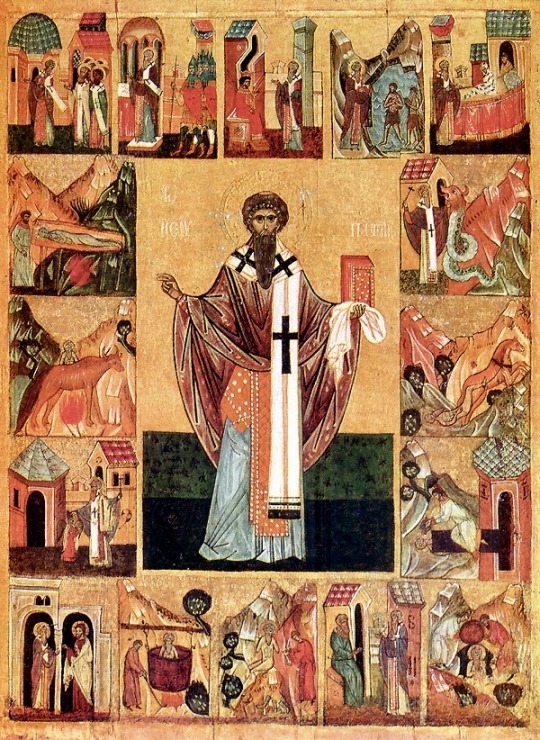
3 notes
·
View notes
Text
Today the church honors Sts. Gurias, Samonas, and Habibus, Martyrs.
Orate pro nobis.
Gurias and Samonas suffered during the persecution against Christians under the emperors Diocletian (AD 284-305) and Maximian (AD 305-311). The two friends Gurias and Samonas, preachers of the Word of God, were arrested in the city of Edessa.
The saints refused to offer sacrifice to the gods, and boldly confessed their faith in Christ. For this they were subjected to cruel tortures: they were beaten, hung up by their hands, heavy weights were tied to their feet, and they were cast into a stifling prison.
The martyrs endured everything with firmness and Samonas uttered a prayer to the Lord, which one of the witnesses to their death wrote down: “O Lord my God, against Whose will not a single sparrow falls into the snare. It was You Who made room for David in his sorrow (Ps. 4:1), Who proved the Prophet Daniel stronger than lions (Dan. 6:16-24), and granted a child of Abraham to be victor over torture and flames (Dan. ch. 3, ch. 14). You know also, Lord, the infirmity of our nature, You see the struggle set before us. Our foe strives to snatch us, the work of Your right hand, away from You and to deprive us of the glory which is in You. With Your compassionate eye watching over us, preserve in us the inextinguishable light of Your Commandments. Guide our steps by Your light, and make us worthy of Your Kingdom, for You are blessed unto ages of ages.” By night, they took the martyrs out beyond the city and beheaded them on this day c. AD 306. Christians secretly buried their holy bodies with reverence.
After some years, the last pagan emperor, Licinius (AD 311-324), began a persecution against Christians. Habibus, a deacon of the Church of Edessa whom the emperor ordered to be arrested for his zealous spreading of the true Faith, presented himself before the executioners when he learned they were searching for him. The saint confessed his faith in Christ. During his multiple days of torture, Abibus was subjected to the scourging and having his body raked with iron rakes by five men. When threatened with more gruesome torture by the governor, the saint is quoted as saying: "As a tree that is watered bears fruit, so is my spirit strengthened by torment", frustrated by his powerless efforts, the Governor replied: "Does your faith teach you to hate your own body?", to which Abibus replied: "We do not hate this material body, but we rejoice in the spiritual reality; the suffering of this present time is not worth comparing with the glory that awaits those who embrace Christ." The governor mockingly replied: "Is this suffering you endure glorious?" Abibus responded: "It is not for you to ask questions, for your unbelief is not worthy to hear the answers to them, as the Scripture teaches us: do not cast that which is holy to dogs, nor pearls before swine."
Abibus was sentenced to be burned at the stake. When walking up to the stake, his mother was forced to walk beside him, dressed in all-white as if going to a feast day. He blessed the crowd before him, to which the crowd responded: "Pray for us in the presence of the Lord!" After this exchange, the martyr entered the fire on his own accords. When the fire went out, his mother and relatives found his body unharmed. They buried the martyr next to Saints Gurias and Samonas because they were martyred on the same day though several years apart, and they are commemorated together.
Almighty God, who gave to your servant Gurias, Samonas, and Habibus boldness to confess the Name of our Savior Jesus Christ before the rulers of this world, and courage to die for this faith: Grant that we may always be ready to give a reason for the hope that is in us, and to suffer gladly for the sake of our Lord Jesus Christ; who lives and reigns with you and the Holy Spirit, one God, forever and ever.
Amen.

2 notes
·
View notes
Text
Today the church honors St. Demetrius Mikhailovich Benevolenskii, Martyr.
Ora pro nobis.
Demetrius Mikhailovich Benevolenskii was born on October 10, 1883 in Vishny Volochyok, Tver province. After his ordination to the priesthood in 1911, he was assigned to the Church of the Great Martyr Demetrius in the village of Ostrovno and, in 1919, to the Church of All the Afflicted in the village of Panoshino [today Udomlya]. He later served at the Church of the Tikhvin Icon of the Mother of God in the village of Sinev in the Dubrovo Sonkovskii District of the Tver region.
As a result of his intense dedication to his pastoral duties, he had been arrested and imprisoned several times by the Soviet Socialist regime. After his final arrest, he was shot on November 27, 1937. On September 19, 1999, after the fall of the Soviet Socialist state, he was numbered among the new martyrs and confessors of Russia.
Almighty God, who gave to your servant Demetrius boldness to confess the Name of our Savior Jesus Christ before the rulers of this world, and courage to die for this faith: Grant that we may always be ready to give a reason for the hope that is in us, and to suffer gladly for the sake of our Lord Jesus Christ; who lives and reigns with you and the Holy Spirit, one God, forever and ever.
Amen.
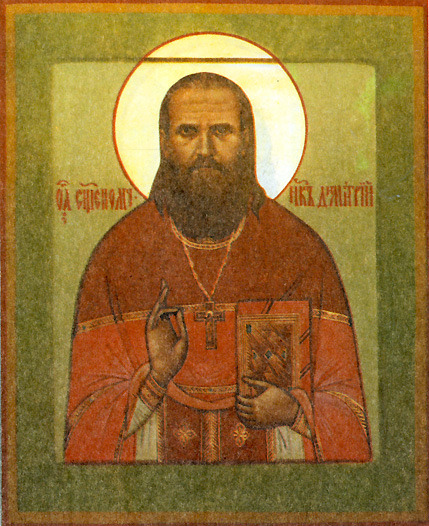
1 note
·
View note
Text
Today the Church honors Sts. Antoninus, Nicephorus, Germanus, and Manetha, Martyrs.
Orate pro nobis.
Here is an account of their martyrdom written by St. Eusebius, Bishop of Caesarea.
In the Sixth Year of the Persecution in our Days in Caesarea (308 A.D.)
And when some time had elapsed after these things which I have related, another company of God's martyrs, amounting in number to one hundred and thirty, was sent from the land of Egypt into our country. And all of these had also undergone the same tortures in their eyes and legs as the former martyrs; and some of them were sent to the mines of Israel, and some of them were delivered over to the judges in Cilicia to be chastised with injurious and insulting tortures. But from us the flame of the persecution ceased a little, the sword having been satiated with the blood of the holy martyrs; and a little rest and cessation threw some check upon the persecution which took place in our days. And continuously the scourge of God was sent upon Maximinus, the wicked tyrant, of all these evils, of which the governors of the countries were the instructors and cunning ministers, and that duke who was the general of the army of the Romans. And because of those things which took place, they urged the Logistae of the cities, and the military commander, and the Tabularii to rebuild with diligence what was fallen of the temples of idols, and to compel all the men, together with their wives and children and slaves, and even the infants at the breast, to sacrifice and offer libations to devils, and also to force them to eat of the sacrifices. And a command was given that every thing that was sold in the market should be polluted with the libations and the sprinkling of the blood of the sacrifices. When these things, therefore, were done in this manner, these actions which were performed were abominated, even by the heathen who were without faith.
Great tumult, therefore, and consternation, such as there had never been the like before, overwhelmed all those who belonged to us in every place; and the souls of every one were set in affliction and trouble. But the Divine Power, on account of those things which had taken place, gave encouragement to such as belonged to Him, so that they were able to tread under foot the threats of the judges, and to despise their tortures.
But some servants of Christ's people, who in the stature of their bodies were only youths, but their soul was armed with the worship of God, both came of themselves, and when the governor was offering libations to idols in the midst of the city, suddenly rushed upon him, and called upon him to abandon his error, "For there is no other God but one, the Maker and Creator of all things;" and when they were asked [by Governor Firmillian] who they were, they confessed they were Christians. No sooner, then, were these words uttered than they received sentence of death, and so passed on easily and without delay to Him in whom they made their confession. The name of the first of them was Antoninus, and the second was called Zebinas, and the third's name was Germanus; and these things were done on the thirteenth of Teshri [November] the latter.
And they had at the same time a companion, a sister, one of the Lord's virgins, a chaste and courageous maiden, who came from the city of Baishan. She, however, had not acted in the same manner as those had done with whom she became confessor; for she had been brought by force from Baishan, and suffered insults and cruel tortures from the judge before she was condemned. But one of those who was set over the streets of the city was the originator of these evils. His name was Maxys, and he proved to all men that he was worse even than his name. This same blessed woman he stripped naked, and she was only left covered from the groin downwards, in order that he might indulge his lustful eyes in looking at the rest of her limbs; and he carried her about through the whole city, being tortured with straps; and afterwards took her before the tribunal of the governor, where with great boldness of speech she made the confession of her faith that she was a Christian; and there also displayed her courage and patience under every kind of torture; and was afterwards delivered over by the governor to be burnt with fire.
Almighty God, who gave to your servants Antoninus, Nicephorus, Germanus, and Manetha boldness to confess the Name of our Savior Jesus Christ before the rulers of this world, and courage to die for this faith: Grant that we may always be ready to give a reason for the hope that is in us, and to suffer gladly for the sake of our Lord Jesus Christ; who lives and reigns with you and the Holy Spirit, one God, forever and ever.
Amen.
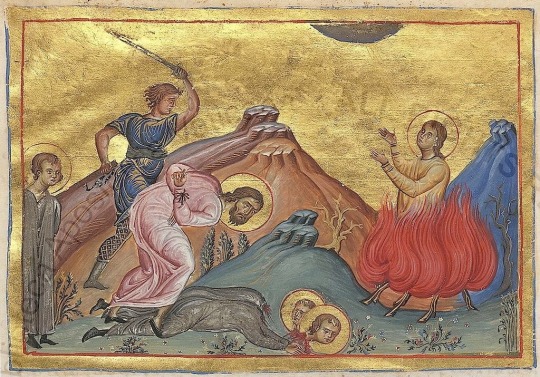
2 notes
·
View notes
Text
Today the Church honors Sts. Castorius, Claudius, Nicostratus, and Symphorian, Martyrs.
Orate pro nobis.
Castorius, Claudius, Nicostratus, and Symphorian are often called "the four crowned martyrs" who were tortured and executed in Pannonia, Hungary during the reign of Diocletian (AD 284-305). According to legend, they were employed as carvers at Sirmium (Mitrovica, Yugoslavia) and impressed Diocletian with their art, as did another carver, Simplicius. Diocletian commissioned them to do several carvings, which they did to his satisfaction, but they then refused to carve a statue of Aesculapius to be used in a temple dedicated to him, as they were Christians. The emperor accepted their beliefs, but when they refused to sacrifice to the gods, they were imprisoned.
When Diocletian's officer Lampadius, who was trying to convince them to sacrifice to the gods, suddenly died, his relatives accused the five of his death. To placate the relatives, the emperor had them beaten and then executed. They were put into leaden caskets alive and drowned in the River Sava. This happened towards the end of AD 305.
Almighty God, who gave to your servants Castorius, Claudius, Nicostratus, and Symphorian boldness to confess the Name of our Savior Jesus Christ before the rulers of this world, and courage to die for this faith: Grant that we may always be ready to give a reason for the hope that is in us, and to suffer gladly for the sake of our Lord Jesus Christ; who lives and reigns with you and the Holy Spirit, one God, forever and ever.
Amen.
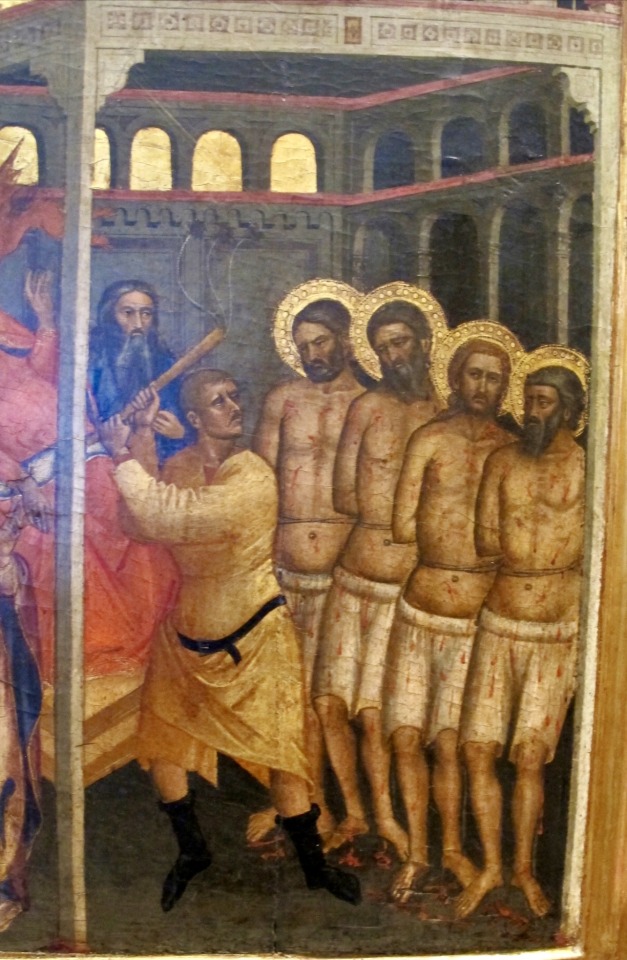
#father troy beecham#christianity#jesus#god#saints#salvation#peace#faith#martyrs#early church#christian persecution
3 notes
·
View notes
Text
Today the Church honors the 33 Martyrs of Melitene.
Orate pro nobis.
The holy martyr Hieron was born in the city of Tiana in great Cappadocia. Raised by a pious Christian mother, he became a kindly and good Christian.
The co-ruling emperors Diocletian (AD 284-305) and Maximian (AD 284-305) sent a large military detachment headed by Lysias to Cappadocia in AD 290 to eradicate Christianity there, and also to conscript healthy and strong men into the imperial army. Among those pressed into service, Lysias also ordered his men to draft Hieron, who was distinguished by his great physical strength and dexterity. But Hieron refused to serve emperors who persecuted Christians. When they attempted to seize him by force and bring him to Lysias, he took a stick and started beating the soldiers who had been sent to bring him. The soldiers scattered, ashamed of being defeated by a single man. Hieron then hid himself in a cave with eighteen other Christians. Lysias would not risk losing his soldiers by storming the cave.
Upon the advice of Cyriacus, one of Hieron’s friends, Lysias lifted the siege of the cave and withdrew his detachment. Then Cyriacus persuaded Hieron not to offer resistance to the authorities. He and the other new conscripts and accompanying soldiers were sent to the nearby city of Melitene.
Soon Hieron had a vision in his sleep, in which his impending martyrdom was foretold. Lysias told the soldiers gathered at Melitene to offer sacrifice to the pagan gods. Hieron and another thirty-two soldiers refused to do this, and openly confessed their faith in Christ. Then the persecutor gave orders to beat the martyrs, and to cut off Hieron’s arm at the elbow. After cruel tortures they threw the martyrs into prison barely alive, and they beheaded them four days later.
A certain rich and illustrious Christian by the name of Chrysanthus ransomed Hieron’s head from Lysias. When the persecutions finally ceased, he built a church on the place where they executed the holy martyrs, and he placed the venerable head in it. The bodies of all the executed saints were secretly buried by Christians. In reign of the emperor Justinian, during the construction of the church of Hagia Eirene (Holy Peace), the venerable relics were uncovered and found incorrupt.
The other martyrs are: Hesychius, Nicander, Athanasius, Mamas, Barachius, Callinicus, Theogenes, Nikon, Longinus, Theodore, Valerius, Xanthius, Theodoulus, Callimachus, Eugene, Theodochus, Ostrychius, Epiphanius, Maximian, Ducitius, Claudian, Theophilus, Gigantius, Dorotheus, Theodotus, Castrichius, Anicletus, Themelius, Eutychius, Hilarion, Diodotus and Amonitus.
Almighty God, who gave to your servants the Martyrs of Melitene boldness to confess the Name of our Savior Jesus Christ before the rulers of this world, and courage to die for this faith: Grant that we may always be ready to give a reason for the hope that is in us, and to suffer gladly for the sake of our Lord Jesus Christ; who lives and reigns with you and the Holy Spirit, one God, forever and ever.
Amen.
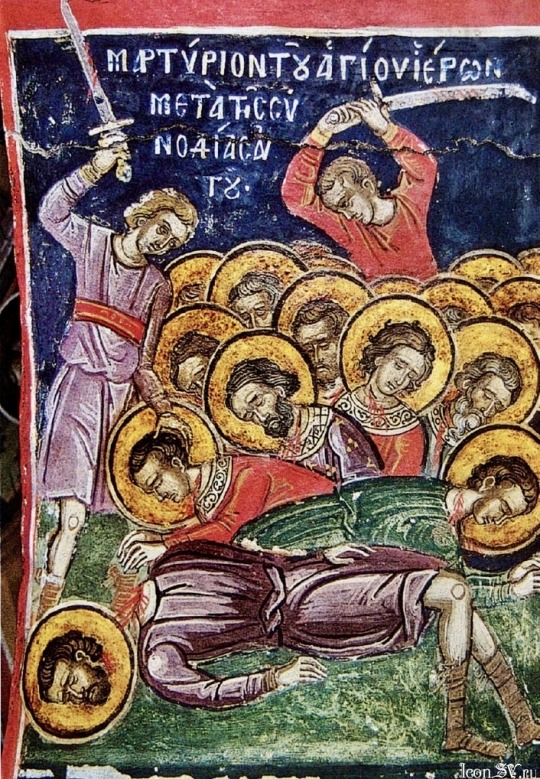
0 notes
Text
Fr. Troy Beecham
Sermon, Proper 26A 2023
Matthew 23:1-12
“Then Jesus said to the crowds and to his disciples, ‘The scribes and the Pharisees sit on Moses’ seat; therefore, do whatever they teach you and follow it; but do not do as they do, for they do not practice what they teach. They tie up heavy burdens, hard to bear, and lay them on the shoulders of others; but they themselves are unwilling to lift a finger to move them. They do all their deeds to be seen by others; for they make their phylacteries broad and their fringes long. They love to have the place of honor at banquets and the best seats in the synagogues, and to be greeted with respect in the market-places, and to have people call them ‘rabbi’. But you are not to be called rabbi, for you have one teacher, and you are all brothers. And call no one your father on earth, for you have one Father—the one in heaven. Nor are you to be called instructors, for you have one instructor, the Messiah. The greatest among you will be your servant. All who exalt themselves will be humbled, and all who humble themselves will be exalted.”
Over the last several Sundays, we have seen Jesus being confronted by those who sought to discredit Him. In every case, He turns their attempts back upon themselves, much to their astonishment and consternation, and often to the delight of the common folk listening. In today’s Gospel reading, we see Jesus teaching His disciples, and all who were listening, just moments after the Sadducees had tried to trip up Jesus on an issue of logic and His teaching about the resurrection of the dead on the Last Day (the Sadducees did not accept the hope of the resurrection). That there were Pharisees in the crowd is without doubt by what Jesus says to His disciples and the gathered crowd in this teaching.
Jesus tells his disciples and the whole audience, which included the Pharisees and likely some Sadducees, that the Pharisees have authority to teach the Torah and the oral tradition, which the Pharisees considered to be an unbroken chain of teaching reaching back to Moses and had equal weight with the Torah. This is why Jesus says that they sit in Moses’ seat. But in saying this, to honor their teachings, He also says with searing irony to beware of their practices, which were not in alignment with the Torah. They are ‘great ones’ (rabbi means ‘great one’) rabbis, but they were teaching a severe, inhumane interpretation of the Law, and Jesus accuses them of not following their own teachings, but rather of using the Torah as a means of intimidating and controlling the people. They obsessed over minute and perplexing interpretations of the Law. In Luke 11:46, Jesus warns the Pharisee Torah scholars/lawyers of his time: “‘Woe also to you lawyers! For you load people with burdens hard to bear, and you yourselves do not lift a finger to ease them’”. In contrast, in Matthew 11:28-30, He says: “‘Come to me, all you that are weary and are carrying heavy burdens, and I will give you rest. ... For my yoke is easy, and my burden is light’”. In Acts 15:10, Peter says of those who expect Christians to follow Jewish practices: “‘why are you putting God to the test by placing on the neck of the disciples a yoke that neither our ancestors nor we have been able to bear?’”.
Jesus says the Pharisees are vain and hypocritical (hypocrite is the Greek word for stage acting), exerting great effort to appear pious. “Phylacteries” are small boxes containing biblical texts, worn on the arm or the forehead, and “fringes” are prescribed in Numbers and Deuteronomy as a way of remembering to live by the commandments. But using such righteous reminders of the Lord our God as ostentatious displays nullifies their purpose. The practice of “the longer the fringes, the more pious the wearer” is spiritually void, and in fact calls into disrepute the teachings of the Torah. Jesus lays out four examples of their vanity and love of power over other people. Jesus then says that His disciples are not to arrogate to themselves the title of ‘great one’, rabbi, and seek to assume authority over their fellow disciples, because He, Jesus, is our one teacher, the only truly ‘great one’, and we are all His lifelong disciples. This does not mean, obviously, that we should not have teachers and leaders amongst us now, or how else would the Gospel be taught to all nations and the sacraments be celebrated? The issue is that no disciple of Jesus should think of themselves more highly that any other, nor should they seek to ‘lord it over’ others. Rather, His disciples must think of themselves as the servants of all, which He showed so shockingly, yet beautifully, when He washed the apostle’s feet at the Last Supper, something only a servant would normally do.
What do we make of Jesus saying “call no man ‘father’ on earth”? Christ’s word about never calling anyone upon the earth their father finds its true meaning in the context of His denunciation of the Pharisee’s false piety, their arrogance and pride, and their spiritual abuse of the people. Jesus is warning His disciples, including us today, to reject the insistence upon public honor and giving personal loyalty to anyone. In rabbinic tradition, there were schools devoted to the person and teachings of certain rabbis. The rabbis would accumulate disciples, men whose task it was to memorize the views and words of their rabbi and make them their own. Indeed, those teachers claimed a greater respect from their disciples than was given to their parents, since they reasoned that one’s parents gave only earthly life, while the rabbinic teacher gave spiritual life. They functioned more like modern gurus for those followed them as their personal disciples.
Jesus insisted that such total allegiance and blind loyalty has no place amongst His followers in His Church. The leaders in His Church are never to function as such “fathers”, commanding personal allegiance and accumulating personal disciples. Such complete allegiance may only be given to God, our Father in heaven. On earth, the only Leader to whom such devotion should be given is Jesus, the Messiah of all. His disciples are all brothers, all siblings, and even the leaders among us must look in all humility to the same Leader and Lord, the Christ of God (Matthew 23:8-10).
In all of this, what matters is where the heart finds its home, and to whom one gives ultimate loyalty. The rabbis of the Pharisees claimed personal loyalty from their disciples as their due in a kind of personality cult. Such a cult and such devotion have no place amongst Jesus’ followers. Cults are no new things. Jesus warned his disciples then to beware of falling into a personality cult, and he warns us the same today. The issue is not so much whether one calls their priest either “Father Tom” or “Pastor Tom”. The issue is the relationship between the teacher and the student. One can be led by Father Tom and address him as “Father Tom”, but Father Tom can never command ultimate personal loyalty—nor, as a true disciple of Jesus, would he wish to do.
The temptation to accrue personal disciples is a perennial one, and not confined to the Pharisees, scribes, and rabbis of the first century AD. We can see such cults of personality and the demand for personal allegiance in many spheres of life, including religion and politics. Though not using the ancient Middle Eastern honorific “father”, such people function as “fathers”, and “mothers”, to their supporters, authoritative gurus, demanding like the rabbis of old personal loyalty (and financial support).
It is meant to be otherwise among Churches whose clergy use the title “Father” as an honorific title, a title no more different than calling your physician “doctor”. Clergy are all meant to dress alike—the same black cassock, or at least black shirt, pants, and white collar. Their teaching is the same, so that it scarcely matters whether one goes to Father Lawrence’s parish or Father Justin’s. The use of a common title and of common clerical dress are intended to obscure and impede such personal style as would promote a cult of personality. Different clergy have different gifts, of course, and different parishes have different strengths and weaknesses. But the same Faith is proclaimed by all orthodox clergy in the same way. There is not an Italian orthodoxy here and an American orthodoxy there. Ecclesiastically speaking, there is but One who is the Teacher, and all clergy are brothers to those under their spiritual care (Matthew 23:8). Only Jesus is our earthly Leader, and He has taught us that God in heaven is our one, true Father, the only source of our being. We therefore call no man on earth the source of our being, our true and life-giving father apart from Him.
So, what can we then say, brothers and sisters, to express the heart of Jesus’ teaching in today’s Gospel reading? Humility is the source of all true virtue, and all religiosity lacking humility, such as thinking of any man or woman as the source of our life, is false. Titles, such as father, are only pernicious when they lead us to cult like devotion to another human, leading us away from our one Lord Jesus and from total dependence in faith upon our one Father in heaven, the source of our life. Pray, then, that God our Father will give to each of us the humility of His Son, our Savior Jesus, that we might be servants of all.
Almighty and merciful God, it is only by your gift that your faithful people offer you true and laudable service: Grant that we may run without stumbling to obtain your heavenly promises; through Jesus Christ our Lord, who lives and reigns with you and the Holy Spirit, one God, now and forever. Amen.

1 note
·
View note
Text
Today, the Church honors Sts. Nicander, Bishop of Myra, and st. Hermas the Presbyter, Martyrs.
Orate pro nobis.
Nicander and Hermas were disciples of the holy Apostle Paul’s follower and fellow ascetic, the holy Apostle Titus of the Seventy, who was made the Bishop of Crete, and they were ordained by him to the priesthood, and later he ordained Nicander to be the Bishop of Myra.
Living the ascetic life amid incessant pastoral works, the saints converted many pagans to Christ. For this they were arrested in the early 2nd century. AD and brought before the city prefect, Libanius. Neither flattery nor threats swayed the holy martyrs to renounce Jesus. Then Libanius gave orders that they be tortured.
The saints endured fierce and inhuman torments: they were tied to horses and dragged over stones, their bodies were raked with iron hooks, and they were cast into a hot oven. The Lord helped them endure things that a mere man by his own strength could not endure. Towards the end, iron nails were hammered into their heads and hearts. They were thrown into a pit, then covered over with earth.
After enduring such a cruel death, now they live forever in the joy of the Lord.
Almighty God, who gave to your servants Nicander and Hermas boldness to confess the Name of our Savior Jesus Christ before the rulers of this world, and courage to die for this faith: Grant that we may always be ready to give a reason for the hope that is in us, and to suffer gladly for the sake of our Lord Jesus Christ; who lives and reigns with you and the Holy Spirit, one God, forever and ever.
Amen.
0 notes
Text
Today, the Church honors Sts. Nicander, Bishop of Myra, and st. Hermas the Presbyter, Martyrs.
Orate pro nobis.
Nicander and Hermas were disciples of the holy Apostle Paul’s follower and fellow ascetic, the holy Apostle Titus of the Seventy, who was made the Bishop of Crete, and they were ordained by him to the priesthood, and later he ordained Nicander to be the Bishop of Myra.
Living the ascetic life amid incessant pastoral works, the saints converted many pagans to Christ. For this they were arrested in the early 2nd century. AD and brought before the city prefect, Libanius. Neither flattery nor threats swayed the holy martyrs to renounce Jesus. Then Libanius gave orders that they be tortured.
The saints endured fierce and inhuman torments: they were tied to horses and dragged over stones, their bodies were raked with iron hooks, and they were cast into a hot oven. The Lord helped them endure things that a mere man by his own strength could not endure. Towards the end, iron nails were hammered into their heads and hearts. They were thrown into a pit, then covered over with earth.
After enduring such a cruel death, now they live forever in the joy of the Lord.
Almighty God, who gave to your servants Nicander and Hermas boldness to confess the Name of our Savior Jesus Christ before the rulers of this world, and courage to die for this faith: Grant that we may always be ready to give a reason for the hope that is in us, and to suffer gladly for the sake of our Lord Jesus Christ; who lives and reigns with you and the Holy Spirit, one God, forever and ever.
Amen.
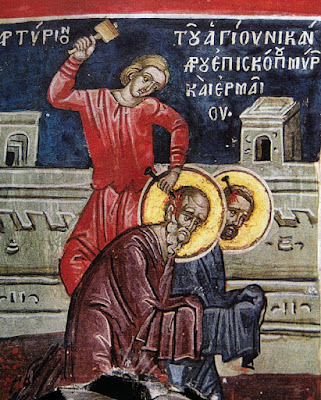
0 notes
Text
Today the Church honors Acsepsimas, Joseph, and Aitillaha, Martyrs of Persia.
Orate pro nobis.
Acepsimas was the bishop of Hnaita, residing at Paka in western Persia. His flock devotedly loved their hierarch for his ascetic life and tireless pastoral work. He and several companions, including the priest Joseph of Bet-Katoba, who was then 70 years old, and the deacon Aitillaha of Bet-Nuhadra, who was then 66 years old, were arrested by Shapur II for refusing to worship according to the Zoroastrian religion. Acepsimas was taken in chains to Arbela (modern Erbil) before the governor. This judge was astonished how he could deny the divinity of the sun, which all the East adored. The martyr answered him, expressing his astonishment how men could prefer a creature to the Creator. By the orders of the governor he was laid on the ground with his feet bound, and in that posture barbarously scourged, till his whole body was covered with blood. He was then thrown into prison.
Acepsimas endured three years of prison before he was racked and whipped to death on AD October 10, 376. Joseph was taken to Hdajab where he was tortured until he was stoned to death by Christians who had become apostate rather than be martyred at Tabaha on the Friday after Pentecost, AD 377. Aitillaha was stoned to death at Destegerd on AD November 3, 377.
They were among the last martyrs of the Christian persecution of Shapur II, during which roughly 16,000 were known to have been martyred, and a multitude of those whose names were not known. The book of their acts, which has survived, is said to be genuine.
Almighty God, who gave to your servants Acsepsimas, Joseph, and Aitillaha boldness to confess the Name of our Savior Jesus Christ before the rulers of this world, and courage to die for this faith: Grant that we may always be ready to give a reason for the hope that is in us, and to suffer gladly for the sake of our Lord Jesus Christ; who lives and reigns with you and the Holy Spirit, one God, forever and ever.
Amen.
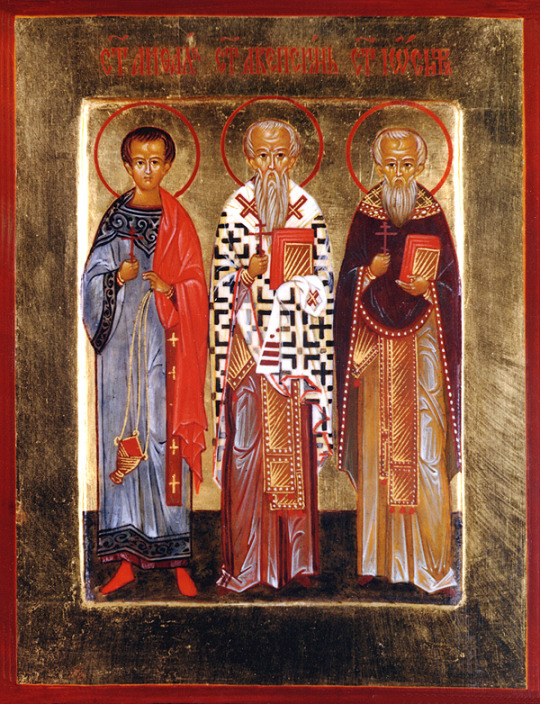
1 note
·
View note
